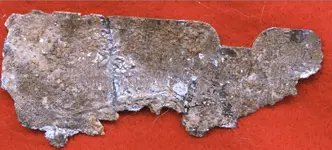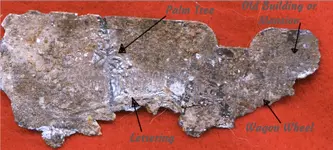Sod Buster had replied while I was gathering my thoughts and tuned in to your Presidential inauguration on TV. I'm sure he's correct, but this is what I was about to post (for what it's worth):
My German is a little rusty, but I read that as two separate words “Für unsere…” followed by another word or words after the Teutonic cross that perhaps begins “hi…” or “bi…”. The first part would translate as “For our…”
The possessive pronoun “our” varies in German as “unser”, “unsere” or “unsuren” according to the case, gender and plurality of the words following. It’s complicated but, as a simple example, it would be “unser land” for “our country” but “unsere landsleute” for “our countrymen”.
Phrases beginning “For our…” were common patriotic expressions for Germany in both World Wars (“For our Kaiser/Fatherland/Victory etc”) but I can’t figure out what the second part of yours might be. Nevertheless I think it’s some kind of patriotic message from WWI. The original Prussian Teutonic cross from 1813 had the initials "FW" for King Friedrich Wilhelm III at the centre, while those following had a “W” for the Kaisers Wilhelm I and Wilhelm II through to the end of WWI.
If that is a palm tree as part of the decoration then I think it could well be tobacco/cigarette/snuff related. In Germany, so-called “orientzigaretten” had the major market share until the beginning of WWII. These were generally produced in Egypt from Turkish tobacco and so both commercial packages and smoking-related paraphernalia frequently had Egyptian imagery. That’s also why the American Camel brand (from 1913) used the imagery of a camel, pyramids and palm tree for example.





